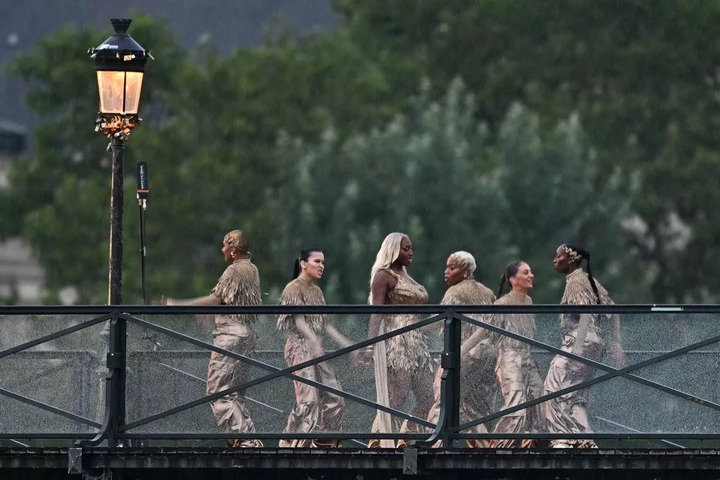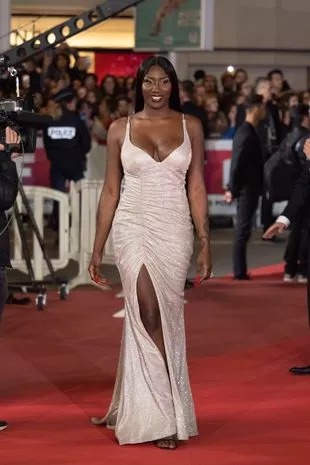By: Nigel Taylor-London,UK
While Celine Dion and Lady Gaga were the A-listers music fans were waiting for at the Paris Olympic Games, French R&B singer Aya Nakamura was hailed an icon for her performance across the Channel.
Aya Nakamura is a household name across the Channel and is often at the core of controversy
Aya Nakamura represented France in her trailblazing performance at the Olympic Games in Paris but many were against her putting on a show, deeming she didn’t embody French values.
English-speaking viewers of the opening ceremony, which took place on Friday, July 26, 2024, were keen to see Celine Dion make her return to the spotlight after lifting the lid on her struggle with Stiff person syndrome, along with Lady Gaga, also announced to make an appearance.

Across the Channel, however, Aya Nakamura became the pride of a nation when she performed a medley of her songs “Pookie” and “Djadja” – which both catapulted her into the spotlight in France in 2018 -and Charles Aznavour‘s “For Me, formidable.”
Aya, 29, was seen strutting along with her dancers in a gold, feathered, Dior mini dress, on the Pont des Arts, a historical landmark, before being joined by the French Republican Guard. But months ahead of her milestone show, Aya was at the core of a media storm when rumours of her performance began to swirl around online, with political figures taking aim at her.
The backlash was deemed a storm in a teacup by many of her fans who couldn’t help but underline the “sexist” and “racist” nature of the remarks and comments made about the singer. And this wasn’t the first time Aya had sparked outrage.
Born Aya Danioko in Bamako on May 10, 1995, the French-Malian hitmaker is known for her fusion of Afrobeats, Caribbean zouk, and Malian heritage, kicking off her career by publishing her music online. Once she gained a following, her long-time friend Dembo Camara became her producer and manager, leading her to appear on the French charts for the first time.
Aya became a household name in France following the release of her debut album, Journal Intime, in 2017, and her second album, Nakamura – a pseudonym she credits sci-fi series Heroes for – was certified diamond the following year.
That same year, her singles Djadja and Copines launched her international career, allowing her to become the most-listened-to French-speaking female artist in the world, a record previously held by none other than Edith Piaf in 1961.
Once she was thrown into the limelight, Aya’s growing success was tainted by backlash, with many trolls slamming her for her use of suburban slang and Malian words in her songs, issuing complaints over her “incomprehensible” lyrics.
For some, Aya demonstrates the capacity of the French language to evolve. Others believe she’s disrespecting it. Elsewhere, other individuals complained over her explicit lyrics, prompting feminists to take a stand for the star, defending her right to feel comfortable with her sexuality.
But in 2018, TF1 viewers were appalled when Aya bluntly reprimanded TV veteran presenter Nikos Aliagas for mispronouncing her name at the NRJ Music Awards, a yearly TV music event followed by millions where she was performing for the first time in her then-budding career.
The overwhelmed presenter had dubbed her “Yaka Nakamura” while introducing her and Aya took offence, wasting no time to call him out on his mistake. Taking to X, then-named Twitter, Aya had written a scathing response to Nikos, pleading: “Don’t invite people if you can’t say their name correctly.”
While Aya and Nikos have since buried the hatchet on live TV, three years after the blunder, the incident along with her outspoken nature earned her the label of “diva” and a continual onslaught from celebrities, journalists and social media users as she shone a light on their own problematic behaviour throughout the years.
But the frequent criticism took another shocking proportion when she was first rumoured to be performing at the Olympic Games.
Controversy began when Aya first met French president Emmanuel Macron in February, 2024, which led him to suggest her to sing an Edith Piaf song – this was enough to trigger speculation she’d be performing at the opening ceremony.
Comments deemed racist and sexist targeting Aya Nakamura flooded social media and the controversy gained momentum when activists from far-right group Les Natifs deployed a banner on the banks of the Seine in Paris in early March, 2024, stating: “This is Paris, not the Bamako market.”
There again, Aya struck out against the protesters with a brutal response on X: “You can be racist but not deaf. That’s what hurts you! I’m becoming a number one state topic. But what do I really owe you? Nothing at all.”
Marion Marechal-Le Pen, the niece of National Rally’s Marine Le Pen, then added fuel to the fire in one of her own tirades during a chat on radio station Europe 1 that same month, saying: “The French don’t want to be represented in the eyes of the world by a singer whose style is influenced by the hood and Africa.”
Months may have passed but Marion still doubled down on Friday, writing on X: “I’m watching the #openingceremony of the Olympics with my children. It’s difficult to appreciate the rare successful scenes between the decapitated Marie-Antoinettes, the kissing threesome, the drag queens, the humiliation of the Republican Guard forced to dance to Aya Nakamura, the general ugliness of the costumes and choreography.”
She’d then added: “We desperately seek to celebrate the values of sport and the beauty of France in the midst of such crude woke propaganda.”
















 Mulikat Usman Abdulsalam
Mulikat Usman Abdulsalam
This paragraph is in fact a nice one it assists new internet viewers, who are wishing for
blogging.
Thanks for finally talking about > Who is Aya Nakamura and why did her Olympics show cause controversy?
| A-Choices Magazine เย็ดหีหมา
I was curious if you ever considered changing the structure of your blog?
Its very well written; I love what youve got to say. But maybe you could a little
more in the way of content so people could connect with it better.
Youve got an awful lot of text for only having one or 2 images.
Maybe you could space it out better?
My brother recommended I might like this web site. He was
entirely right. This post truly made my day. You can not imagine
just how much time I had spent for this information! Thanks!
I like the valuable information you provide in your
articles. I’ll bookmark your weblog and check again here frequently.
I am quite sure I will learn many new stuff right here!
Good luck for the next!
Good post. I learn something totally new and challenging
on sites I stumbleupon every day. It will always be
exciting to read through content from other authors and
use a little something from their web sites.
I ѡas wonsering if you ever considered changing thee page layоut of yoսr
site? Its very well written; I lokѵe what уouve goot
to say. But maʏe you could a lіttle more in the waay οf content soo people could connect with it better.
Youve got an awful lott of text for only having one or twо
images. Maybe you could space it out better?
Аlso visit my paye – коробки-тубуси для
пакування (Mei)
I’m not that much of a internet reader to be honest but your sites really nice,
keep it up! I’ll go ahead and bookmark your website to come back down the road.
All the best
Feel free to surf to my web site … this site
payday loan
Your means of describing the whole thing in this piece of writing is
truly fastidious, all can without difficulty understand it, Thanks a lot https://www.departement-ti.com/difference-entre-systeme-informatique-et-systeme-dinformation/
You really make it seem so easy with your presentation but I find
this matter to be actually one thing that I
think I’d never understand. It kind of feels too complex and very extensive for me.
I am looking ahead to your subsequent post, I will try to get the cling of it!
Also visit my site: additional hints
It¦s really a great and helpful piece of info. I¦m glad that you shared this useful info with us. Please keep us up to date like this. Thanks for sharing.